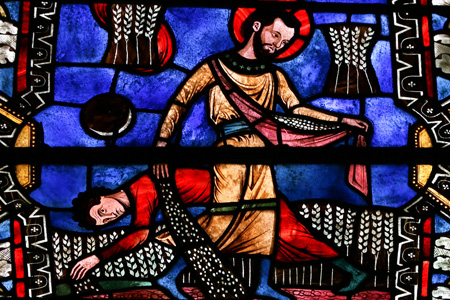Jesus put a parable before the crowds, “The kingdom of heaven may be compared to a man who sowed good seed in his field. ·While everybody was asleep his enemy came, sowed darnel all among the wheat, and made off. ·When the new wheat sprouted and ripened, the darnel appeared as well. ·The owner’s servants went to him and said, ‘Sir, was it not good seed that you sowed in your field? If so, where does the darnel come from?’ ‘Some enemy has done this,’ he answered. And the servants said, ‘Do you want us to go and weed it out?’ But he said, ‘No, because when you weed out the darnel you might pull up the wheat with it. Let them both grow till the harvest; and at harvest time I shall say to the reapers: First collect the darnel and tie it in bundles to be burned, then gather the wheat into my barn.’” (Matthew 13:24-30)
Reflection - The patient gardener
The section of St Matthew’s Gospel from which we are now reading concerns the Kingdom of God. Jesus uses this expression frequently in his teaching. The Kingdom is not heaven, it is the life and heart of God.
We live in the Kingdom when we live according to the mind and heart of God. The Kingdom, or reign of God, breaks into human reality when human beings live, breathe and act out of the life of God; when the heart of God becomes ours; when we allow God to speak and act in and through us.
Jesus frequently uses parables in his teaching - stories drawn from real life, designed to get his listeners to think, ask questions and make decisions.
Today’s parable is a story about wheat and darnel growing together in a field. Apparently darnel, a weed, looks so similar to wheat that it is almost impossible to tell the two apart until the ears appear at harvest time. Only then can you really tell the difference between the two plants. Before that, there may be some signs to do with the direction in which the spikelets grow. Perhaps that is what the servants see and report it to the owner.
They ask if the owner wants them to remove the darnel. The owner says to leave both plants to grow together until harvest when the difference in the plants will be obvious. That will be the time to do the weeding.
So, what does it all mean?
No doubt, there were people in Matthew’s community who thought that the Reign of God would come swiftly and with vehemence and immediately crush what was contrary to it. Others had grown anxious about the fact that the coming of the Kingdom seemed much delayed and wanted to get on with the job of weeding out the ‘evil ones’ according to their own judgement.
The parable, however, urges patience and to leave final judgement to God. What appears to be darnel may yet turn out to be wheat. Only time will tell.
The parable is also a reflection on the mixture of good and evil in the world. But it calls us to reflect, too, on the mix of good and evil we find in our own hearts. What will we turn out to be?
The parable also raises the question: can darnel turn into wheat given God’s patience and mercy?
You can download and print the prayers and reflections for this Sunday.
pdf
Celebrating At Home 16th Sunday in Ordinary Time [PDF]
(3.45 MB)
default
Celebrating At Home 16th Sunday in Ordinary Time [ePub]
(3.44 MB)















